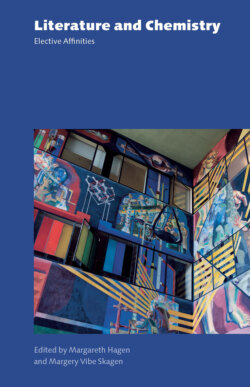Читать книгу Literature and Chemistry - Группа авторов - Страница 30
На сайте Литреса книга снята с продажи.
THE DOUBLE NATURE OF CHEMISTRY
ОглавлениеBernadette Saint-Vincent and Jonathan Simon present central issues in the philosophy of chemistry in their book Chemistry: The Impure Science (2008). They assess chemistry as having the peculiar status of an in-between science. Making, poesis, is the chemist’s major activity, but chemistry is also an intellectual practice. Among the definitions of chemistry’s particular status they quote Marcellin Berthelot’s famous statement: “Chemistry creates its object. This creative faculty, akin to that of art, forms an essential distinction between chemistry and the other natural or historical sciences” (Saint-Vincent and Simon, p. 99). Chemists and historians of science throughout the last century have quoted this claim Berthelot made in the 1870s, even though chemistry has undergone profound transformations since then. The creative and sensorial nature of chemistry – half technical, half theoretical – undoubtedly offers a suitable thematic framework for autobiographical representations, particularly coming-of-age novels that include certain key situations such as the decision to become a chemist, the first experiments as rites of initiation, and the isolated work in the laboratory.
Any reader of Levi’s texts knows that his definition of the nobility of humankind is tightly connected to the notion of homo faber, man the creator. Levi sees himself reflected in the nature of chemistry – both he and chemistry are centaurs – with a double nature: throught and praxis. The theoretical and metaphysical speculations of the astrophysicist Dallaporta, who in 1941 risked his professional career by volunteering to supervise Levi’s final thesis, seem to the young Levi like a “gigantic hippogriff” on which he refuses to mount, since he would prefer to stay grounded, as it were (PT, p. 57). Through chemistry, he dreams about a direct encounter with Matter: “We would be chemists, Enrico and I. We would dredge the bowels of the mystery with our strength, our talent, we would grab Proteus by the throat, cut short his inconclusive metamorphoses from Plato to Augustine, from Augustine to Thomas, from Hegel to Croce. We would force him to speak” (PT, p. 23).19
Levi makes this decision almost as a protest against the blurred and idealist culture of the humanities, as they came to expression in Italy’s Fascist years, in the Gentile liceo where spirit dominates matter. Sacks’s introduction to chemistry is more romantic; it is presented through one of his uncle Tungsten’s great heroes, Carl Scheele, the solitary Swedish chemist who discovered oxygen and chlorine, and who paved the way for the discovery of other elements:
I knew: I wanted to be chemist. A chemist like Scheele, an eighteenth-century chemist coming fresh to the field, looking at the whole undiscovered world of natural substances and minerals, … finding the wonder of unknown and new metals. (UT, p. 45)
More mythical situations follow in both of the biographies, not least because the first rudimentary labs and early experiments function as rites of initiation. Sacks recalls how he set up a little lab at home in an unused back room originally intended for doing laundry; Levi’s first experiments take place when he and his friend Enrico steal into the primitive lab of Enrico’s brother, at the rear of a courtyard (PT, p. 24). The young Sacks and Levi incorporate different character traits of the scientist: Sacks imagines himself as a discoverer and collector of elements, while Levi remains a maker engrossed in a constant struggle with Matter, and a hunter: “We are chemists, that is, hunters: ours are, ‘the two experiences of adult life’ of which Pavese spoke, success and failure, to kill the white whale or wreck the ship” (PT, p. 75).
For Levi, chemistry, because of its double nature, is capable of helping him realise his ideal of human life, to be able to create his objects and use his hands. This makes Levi’s first experiments true rituals of initiation. He becomes a man as he enters the lab, and he comments on the feelings of Enrico and himself as they, at sixteen years old, are about to cross the lab’s threshold: “It seemed to us an embarras de richesses, and it was instead a different embarrassment, deeper and more essential, an embarrassment tied to an ancient atrophy of ours, of our family, of our caste. What were we able to do with our hands?” (PT, p. 24).
The laboratory is a privileged space of work, concentration, and isolation. It protects against contamination and the threatening madness beyond the door. The laboratory’s isolation also reflects the blindness to, or the escape from, unbearable situations and dangers. In Levi’s case, the students who are devoted to work and experiments are sheltered from the threatening situation in Europe,20 whereas Sacks retreats into his laboratory and its isolation during a tragic period for his family, when his brother Michael becomes psychotic.21 The primitive, isolated, rudimental chemistry that involves struggling with matter represents the opposite of the irrational Fascist propaganda that surrounded Levi, just as it offers shelter from the confusing and destructive psychosis of Sacks’ brother.
The many different stages of character development, of growing up with and through the tools of chemistry, cannot be illustrated here, but I believe I have shown that for both Levi and Sacks, the history and the creative and sensorial qualities of chemistry serve as tools for their self-formation and self-presentation. I now turn to the third structural influence on these autobiographies, which comes from the philosophy of chemistry and from the genre of chemistry writing: the constant shifting between micro- and the macro-levels.22
